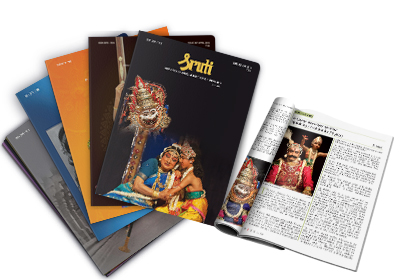NEWS & NOTES
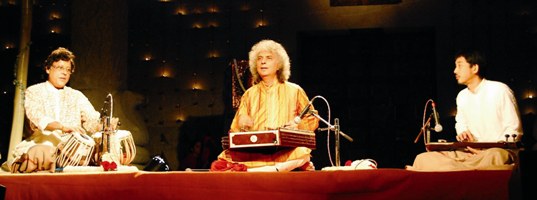
Enriching music and enthralling dance
- B. RAMADEVI
Isha Yoga Centre, situated at the foothills of Vellingiri Mountains near Coimbatore, recently organised a unique festival of music and dance, aptly named ‘Yaksha’. It showcased some of the most exquisite samples of Indian music and dance in an ambience the artists basked in.
A beautiful temple dedicated to Linga Bhairavi, the goddess representing female energy, has been built adjacent to the already well-known Dhyanalinga temple at the Isha Yoga Centre, and this festival followed the consecration of the deity.
The vocal and instrumental concerts were conducted in a lovely pandal, just in front of the sanctum sanctorum of Linga Bhairavi, overlooking the three huge faces of Siva carved in stone, with innumerable lamps glittering in the background. With neatly-arranged, spotless cushions, courteous volunteers, and the ubiquitous cell phones either silenced or switched off, listening to the music there was an experience one would cherish.
COVER STORY
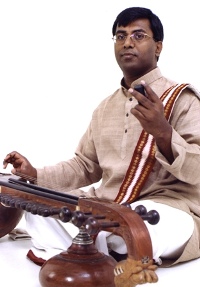
N. RAVIKIRAN
Ambassador of Carnatic music - V. RAMNARAYAN
Chitravina N. Ravikiran is a child prodigy who has evolved into a maestro in his field. He astounded scholars and musicians with his amazing knowledge and musicality even before his third birthday. He was twice blessed – with the right genes as a grandson of Gottuvadyam Narayana Iyengar, and with the perfect environment with his father Narasimhan sacrificing his own career as an instrumentalist to nurture Ravikiran and his siblings and a cousin. Born in 1967, he started his performance career as a lisping vocalist but switched to playing the gottuvadyam in 1979. With his grandmother and mother enriching his childhood days with the great puranic tales of India’s spiritual heritage, Ravikiran knew even as a boy of 12 the significance of the songs he had begun to compose. He has continued to compose kriti-s, tillana-s and music for opera. He has made it his life’s mission to bring to light the wealth of music composed by Oothukadu Venkata Kavi. He has been experimenting with new forms of music, by combining elements of Carnatic music and the western tradition of orchestration and harmony. He calls it Melharmony. He has been a pioneer of e-teaching of Carnatic music.
The Ravikiran we see now is a mature musician – one of the great Indian instrumentalists – but also a committed propagator of his magnificent legacy, taking it to all parts of the world, often the lone representative of Carnatic music in festivals of world music. He has embraced technology to the extent of using it to productive purpose, retaining the original ethos and spirit of his music. His students in India and abroad are devoted to him and his teaching methods with absolute loyalty. He is involved in fusion experiments both here and abroad. He is an inspired speaker on music with a sophisticated vocabulary he has apparently cultivated over the decades to a point it seems spontaneous and natural. His is often the most respected voice in any seminar or symposium on classical music in which the other participants are leading exponents of other traditions of music. In a recent panel discussion on Indian classical instrumental music and instrument making, for instance, he provided some original insights into the making and maintenance of instruments. (Among other things, he urged research by material scientists into the improvement in the volume of the chitraveena. “How can such a huge instrument produce such low volume when a small instrument like the violin can be so much louder?”). He is the author of numerous books on music.
THEATRE
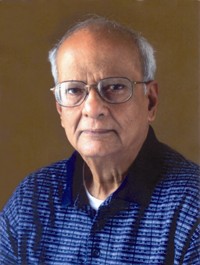
INDIRA PARTHASARATHY
A Tamil author who seems to think in English - V. RAMNARAYAN
The Padma Shri award has been belated Presidential recognition of Indira Parthasarathy’s literary achievements. He has been a prolific writer in Tamil for nearly 50 years, his short stories novels and plays the result of one of the keenest eyes around for politics and the political in our lives. He has a healthy skepticism bordering on cynicism, his penchant for wry humour leavening it somewhat. His deep understanding of Vaishnavism has led him beyond personal faith to an all-questioning search for deeper meaning and the creation of some exciting plays and novels like Nandan, Ramanuja, The Comrades of Jesus, even Aurangzeb. While plays are probably his favourite medium, his novels and short stories too are easily adapted for theatre, as he revels in fashioning sparkling conversation among his characters, full of repartee and literary and political allusions.
There is a hint of tragedy in all of Indira Parthasarathy’s works, lurking beneath a veneer of comedy, though he has never perhaps written a true tragedy of epic proportions or a rip-roaring comedy.
The one probable exception is Krishna Krishna, a monumental work by him, perhaps the most profound expression of his worldview. It is a modern re-examination of the intellect and philosophy, not to mention the compassion, of the blue god. In the foreword to the novel, the author says, “Krishna is a metaphor; he fulfils the dark and lurking desires in our deep Unconscious and represents the collective vision of the community as a whole.”
SPOT LIGHT
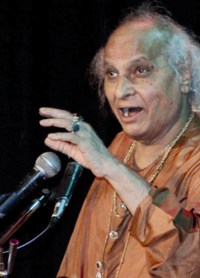
Pandit Jasraj - T.S. ANANTHU
In February 2010 the Central Sangeet Natak Akademi selected Pandit Jasraj and a few other artists and scholars to receive its Fellowship also known as Akademi Ratna. On this occasion, we publish an interesting appreciation of the Hindustani music maestro which throws light on his human qualities.
His human side
I have known Pandit Jasraj from my childhood days. Just 24 then, he used to visit our home in Kolkata to teach my elder brother Nataraj – and, later, my younger sister Lakshmi – Hindustani music. I was too absorbed in my studies to develop any interest in music, but Panditji’s personality fascinated me, and we became good friends. Even though he has now reached the pinnacle of success in his profession, Panditji has not forgotten those times, and takes enormous trouble to keep up the friendship with me and other members of our family.
New to Hindustani music when they moved to Kolkata from the South, my parents were very impressed by a half-hour recital on AIR of Pandit Jasraj and his brother and guru, Pandit Maniram. My brother, who was then 16, expressed a desire to learn music from ‘this voice’, so my parents inquired about and located Pandit Maniram’s home. Jasrajji readily agreed to come to our home twice a week to teach him.

